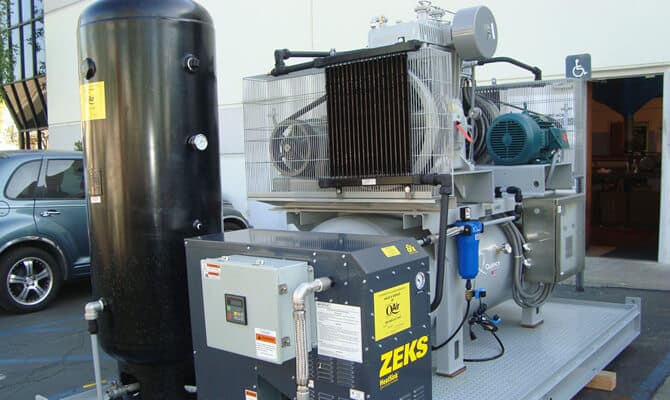Compressors are standard tools that power various devices and applications in industrial workshops. However, using a workshop compressor also comes with its fair share of dangers. If not handled correctly, this equipment may be dangerous in workshop applications.
To maintain high levels of productivity while keeping employees safe, industrial handlers need to adopt the correct workshop compressor safety precautions. Below are some of the underpinning safety practices industrial operators can follow to safely and efficiently use compressors.
Regular Maintenance Checks: Your First Line of Defense
A workshop compressor in good condition is a safe compressor. Check the equipment on a consistent basis to see if there are signs of wear and tear, damage, or loose fittings that compromise the safety aspects of the device. Look at the hoses, fittings, and valves, which can weaken or break down over time.
Listening for unusual sounds and checking for signs of air and oil leaks can hint if there are issues in the interior valve system. Do this regularly. Compressor maintenance does more than just prevent accidents. It lengthens the lifespan of the compressor, ensuring the unit remains in peak condition even after multiple industrial applications.
Keep the Compressor Environment Clean and Clear
A workshop with unnecessary debris or obstructions is a safety hazard, especially to compressors, which need adequate ventilation. Keep the compressor environment clean and clear of unnecessary debris, combustible materials, and potential tripping hazards.
Monitor airflow patterns to make sure the compressor gets the correct amount of ventilation. Blocking the airflow can overheat a compressor and cause it to experience unwanted malfunctions. Keeping a clean workspace also affords operators the best coverage and ease when operating compressors for industrial purposes.
Check Pressure Levels Before Every Use
One of the most important safety precautions when using compressors involves managing the correct pressure levels. Pushing a compressor to the limit or going beyond the recommended pressure points can cause the device to overheat, rupture, and become a major safety hazard. For industrial workshops, this means understanding the pressure requirements of each device connected to the compressor. You should do this before using the compressor for industrial purposes.
Use Appropriate Personal Protective Equipment (PPE)
Industrial workplaces are powerhouses where many tools need to be used to get output. These can also create noise or might be loud enough to damage your eardrums and affect hearing. A proper pair of headphones will muffle noise, so you can focus on industrial work safely. The sound factor plays a major role in the wear and tear of eardrums. The compressors in the industry will make a continuous sputtering sound and will cause hearing damage overtime. To prevent this from happening, get earmuffs and earbuds.
Avoid Using Compressors for Incompatible Tasks
Compressors are workhorses. They can tackle a wide variety of different tasks. However, use them for the wrong purpose, and they can become deadly. Verify your workshop compressor is appropriate for your designated task. Overloading or underloading the compressor can make it run less efficiently and may be a safety concern.
Don’t Forget to Drain the Tank Regularly
Most compressors experience water pooling in the tank. When you release the tank, moisture builds up over time, causing the compressor to spring a leak over time. Regular tank draining can alleviate this common issue, reducing rust and enhancing performance.
Now, the industrial workplace compressor is prone to water accumulation if the humidity levels in the air is significantly high. So, keep that in mind and make it a point to drain the compressor tank at regular intervals. This will extend the life of this device efficiently and prevent the unit from malfunctioning.
Power Down Correctly After Each Use
Before leaving the workshop or changing duty, make sure the compressor is switched off properly. The device should not be powered-up suddenly and should a short-circuit be accidentally triggered, the workshop should not be liable for it. When the machine is unplugged but still holding some amount of air reserve, drain the tank to make sure it does not get released. Following the shutdown sequence written by the manufacturing company is important. Plus, this saves energy and keeps the compressor safe and efficient.
Summary: Ensuring a Safe and Efficient Workshop with Compressor Safety
The workshop compressor is an essential device for all industrial users, but with its power, you need to be careful. Regularly inspect your machine, use protective gear, ensure ventilation in the area, and other tips to prevent accidents. Compressor manufacturers typically give instructions on how such a compressor is to be used, so there is no need to worry about any accidents because the reliability and safety of the machine are ensured.



